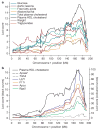Variations in DNA elucidate molecular networks that cause disease
- PMID: 18344982
- PMCID: PMC2841398
- DOI: 10.1038/nature06757
Variations in DNA elucidate molecular networks that cause disease
Abstract
Identifying variations in DNA that increase susceptibility to disease is one of the primary aims of genetic studies using a forward genetics approach. However, identification of disease-susceptibility genes by means of such studies provides limited functional information on how genes lead to disease. In fact, in most cases there is an absence of functional information altogether, preventing a definitive identification of the susceptibility gene or genes. Here we develop an alternative to the classic forward genetics approach for dissecting complex disease traits where, instead of identifying susceptibility genes directly affected by variations in DNA, we identify gene networks that are perturbed by susceptibility loci and that in turn lead to disease. Application of this method to liver and adipose gene expression data generated from a segregating mouse population results in the identification of a macrophage-enriched network supported as having a causal relationship with disease traits associated with metabolic syndrome. Three genes in this network, lipoprotein lipase (Lpl), lactamase beta (Lactb) and protein phosphatase 1-like (Ppm1l), are validated as previously unknown obesity genes, strengthening the association between this network and metabolic disease traits. Our analysis provides direct experimental support that complex traits such as obesity are emergent properties of molecular networks that are modulated by complex genetic loci and environmental factors.
Figures



References
-
- Edwards AO, et al. Complement factor H polymorphism and age-related macular degeneration. Science. 2005;308:421–424. - PubMed
-
- Haines JL, et al. Complement factor H variant increases the risk of age-related macular degeneration. Science. 2005;308:419–421. - PubMed
-
- Sladek R, et al. A genome-wide association study identifies novel risk loci for type 2 diabetes. Nature. 2007;445:881–885. - PubMed
Publication types
MeSH terms
Substances
Associated data
- Actions
- Actions
- Actions
- Actions
- Actions
- Actions
Grants and funding
LinkOut - more resources
Full Text Sources
Other Literature Sources
Medical
Molecular Biology Databases
Research Materials

